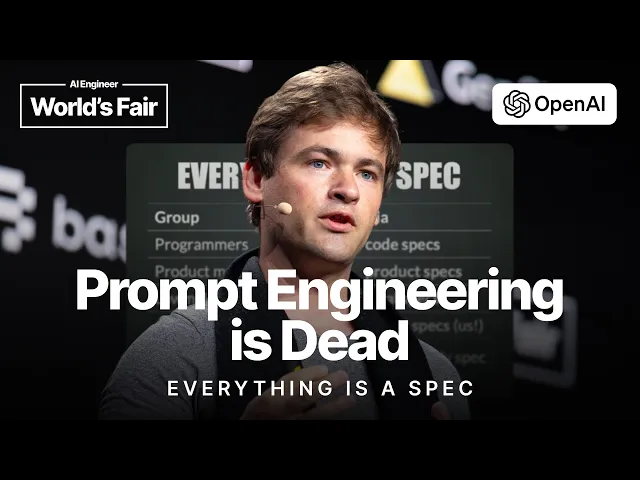The New Code

AI code evolution is blurring human-computer lines
In a recent talk titled "The New Code", OpenAI's Sean Grove offered a fascinating glimpse into how AI is fundamentally transforming the relationship between humans and computers. As developers shift from writing explicit instructions to describing desired outcomes, we're witnessing the dawn of a new programming paradigm that could dramatically reshape software development as we know it. This evolution carries profound implications not just for how we build software, but for who can participate in its creation.
Key insights from Grove's presentation:
-
AI represents a paradigm shift in programming – Rather than dictating precise instructions to computers, developers can now describe what they want to accomplish, with AI handling the implementation details and technical complexity.
-
Interfaces are becoming more natural and conversational – The evolution from punch cards to terminals to GUIs is now progressing toward truly natural language interactions, making computing accessible to virtually anyone.
-
Iteration cycles are collapsing dramatically – What once took months of development can now happen in minutes or seconds, enabling rapid experimentation and refinement.
-
Code generation is becoming more sophisticated and adaptable – Modern AI systems can generate code that handles complex cases, makes reasonable assumptions, and integrates seamlessly with existing systems.
-
Prompt engineering is emerging as a crucial skill – The ability to effectively communicate with AI systems through natural language is becoming as important as traditional programming skills.
Why this matters: The democratization of software creation
Perhaps the most profound insight from Grove's talk is how AI is democratizing software creation. When programming becomes more about describing outcomes than writing syntax, the barriers to entry collapse. This shift isn't merely technical—it represents a fundamental redistribution of creative power.
This democratization arrives at a pivotal moment for the tech industry. For decades, software development has been concentrated among those with specialized skills and formal education. The resulting talent bottleneck has constrained innovation and excluded vast segments of the population from participating in the digital economy. By making software creation accessible to anyone who can articulate a clear goal, AI could unleash a wave of creativity from previously untapped sources.
Beyond the talk: Practical implications and challenges
While Grove's presentation painted an optimistic picture, there are nuances worth exploring. For organizations, this transformation presents both opportunities and challenges that weren't fully addresse
Recent Videos
How To Earn MONEY With Images (No Bullsh*t)
Smart earnings from your image collection In today's digital economy, passive income streams have become increasingly accessible to creators with various skill sets. A recent YouTube video cuts through the hype to explore legitimate ways photographers, designers, and even casual smartphone users can monetize their image collections. The strategies outlined don't rely on unrealistic promises or complicated schemes—instead, they focus on established marketplaces with proven revenue potential for image creators. Key Points Stock photography platforms like Shutterstock, Adobe Stock, and Getty Images remain viable income sources when you understand their specific requirements and optimize your submissions accordingly. Specialized marketplaces focusing...
Oct 3, 2025New SHAPE SHIFTING AI Robot Is Freaking People Out
Liquid robots will change everything In the quiet labs of Carnegie Mellon University, scientists have created something that feels plucked from science fiction—a magnetic slime robot that can transform between liquid and solid states, slipping through tight spaces before reassembling on the other side. This technology, showcased in a recent YouTube video, represents a significant leap beyond traditional robotics into a realm where machines mimic not just animal movements, but their fundamental physical properties. While the internet might be buzzing with dystopian concerns about "shape-shifting terminators," the reality offers far more promising applications that could revolutionize medicine, rescue operations, and...
Oct 3, 2025How To Do Homeless AI Tiktok Trend (Tiktok Homeless AI Tutorial)
AI homeless trend raises ethical concerns In an era where social media trends evolve faster than we can comprehend them, TikTok's "homeless AI" trend has sparked both creative engagement and serious ethical questions. The trend, which involves using AI to transform ordinary photos into images depicting homelessness, has rapidly gained traction across the platform, with creators eagerly jumping on board to showcase their digital transformations. While the technical process is relatively straightforward, the implications of digitally "becoming homeless" for entertainment deserve careful consideration. The video tutorial provides a step-by-step guide on creating these AI-generated images, explaining how users can transform...
